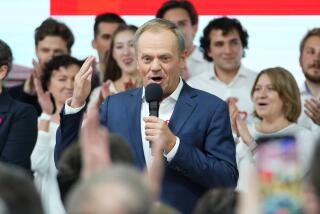Civic Forum’s Next Test: to Hold Together : News ANALYSIS
- Share via
PRAGUE, Czechoslovakia — Few revolutionaries in history have managed to accomplish what the Czechoslovak opposition pulled off in just three weeks: topple an entrenched, repressive regime with nothing more violent than a firm shove.
But as thousands gathered in the city’s main Wenceslas Square on Sunday to hear Civic Forum leaders praise the glory of their success, an entirely new set of challenges loomed on the horizon.
Many of those who have watched the group’s velvet steamroller during its three weeks of existence believe its toughest task after Sunday’s victory could be merely to hold together.
The unlikely assortment of playwrights, artists, rock music critics and others who made the revolution tend not to be team players at heart.
Unlike Poland’s Solidarity, the Civic Forum leadership also has no common opponent in communism. Indeed, Civic Forum membership runs from Communists and the Marxist left to professed followers of free-market U.S. economist Milton Friedman.
The main goals common to all of those who formed the loose opposition coalition have been largely achieved--the Communist hard-liners, including those leaders linked with the Soviet-led invasion of 1968, are gone; political prisoners have been released, and a commission to investigate student beatings has been formed.
Fused together by the white heat of revolution, Civic Forum’s leadership is likely to find unity far more difficult when dealing with divisive issues of future policy.
“It’s an organization of convenience, with people from the Marxist left to a Catholic priest,” said a senior Western diplomat of Civic Forum. “They may last to the elections, but I don’t think they can hold for long. They are too heterogeneous.”
Free elections are expected to be held in mid-1990.
Last week, Civic Forum pledged to enter the election campaign with a list of candidates and also expressed the desire to remain active permanently as a vehicle to promote participatory democracy.
Diplomats and other analysts predict that those Civic Forum activists with serious political ambitions are likely to drift into one of the many new political parties that have begun to appear in recent days with the first whiffs of democracy.
First Deputy Prime Minister Jan Carnogursky has already talked of possibly forming his own party. “I would like to act for some period in politics,” he said. “I’ve already made some steps to establish a movement, not yet a party, for Christian Democrats.”
With victory also comes the sobering responsibility of a share in government and the complex task of preparing the mechanics for a prosperous, democratic future.
While moves to dismantle the secret police apparatus and liberalize laws on press freedom are certain to win applause, hard choices to be made in repairing the damage of decades of central planning and economic neglect will be neither easy nor popular.
For years, the Communist hard-liners maintained an unspoken social compact with the population: They kept the shops full in return for political passivity.
But the cost of directing the nation’s wealth into consumer goods and ignoring industrial investment left the country’s once-proud industries obsolete.
Repairing this damage and dismantling an antique, overmanned, heavily subsidized centrally run economy is bound to bring unemployment, price boosts and a temporary drop in living standards.
Despite the government’s interim nature, it will have to begin restructuring the economy.
“There are many problems in the economy,” Deputy Prime Minister Valtr Komarek said Sunday in an interview with Prague Radio.
In the course of the interview, he talked of sacrifices and the need for new efforts.
Unlike their Polish neighbors to the north, the Czechoslovaks’ preoccupation with economic disruption borders on an obsession.
The opposition was hard-pressed to persuade the country that its two-hour anti-government general strike on Nov. 27--little more than a long lunch hour--would not wreck the economy.
With all three economic portfolios in the Cabinet in the hands of men backed by Civic Forum, the opposition will be closely tied to any hardship.
“They are deeply involved,” commented another diplomat. “The economy will be worse each month, and that means they will have to do the dirty work, even in the transition period.”
Only in the field of foreign policy does there seem a consensus across Czechoslovakia’s new political spectrum.
It seems likely that Jiri Dienstbier, a former Civic Forum spokesman who is the country’s new foreign minister, will follow existing positions.
Both the Communists and Civic Forum talk of negotiating a withdrawal of Soviet military forces from Czechoslovakia, but only within the context of an East-West conventional arms accord.
Civic Forum has also pledged to maintain the country’s existing international commitments.
More to Read
Sign up for Essential California
The most important California stories and recommendations in your inbox every morning.
You may occasionally receive promotional content from the Los Angeles Times.













